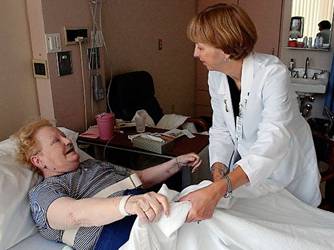|
|
Health Care Workforce Not Enough for Aging Boomers
By Mike Miller, Capital Times
July 25, 2008

Nursing schools statewide have increased enrollment to head off the looming health care worker shortage, but UW administrators say they lack the funds to accept all qualified applicants.
The latest national report on a growing crisis in the health care workforce received insant endorsement from University of Wisconsin officials who will be in the forefront of heading off the crisis, if that is possible.
The Association of Academic Health Centers issued a new report titled "Out of Order, Out of Time: The State of the Nation's Health Workforce" and like other similar reports it says the nation's policymakers both in government and private concerns are ill-prepared to address what it calls a rapidly looming health workforce crisis.
The facts are simple and well-known: an aging population is going to be demanding increased medical care at a time when the workforce is shrinking and might not be able to provide enough health care workers to carry the load.
"The problems discussed in the report are not new, but the time has come to take a much more aggressive stance regarding policies that acknowledge how critical the workforce issue is to quality health care," says UW-Madison School of Nursing Dean Katharyn A. May.
May said although nursing schools around the state have increased enrollment to meet the challenge, schools continue to turn away qualified applicants for nursing schools because of insufficient funding for additional faculty and clinical training sites.
Those thoughts were echoed by UW School of Pharmacy Dean Jeanette Roberts who said the the issue of an adequate health workforce "must become a domestic priority." She also cited a faculty shortage as being part of the problem. "Without faculty of the proper quality and quantity, we can't educate the number of graduates we need to meet the workforce challenge or to advance our critical research mission that underpin many areas of health care," she said.
UW School of Medicine and Public Health Dean Robert N. Golden also praised the latest report, say it "confirms what several previous reports predicted -- our current policies are not addressing the growing shortage of health care providers."
The report says the general workforce must increase by 58 million workers over the next three decades if the same rate of productivity is to be maintained. But current population trends show the workforce will increase by only 23 million during that time, creating a labor shortage of 35 million workers.
Most of those projected shortages, the report said, are expected to involve workers with specific skills such as health care professionals.
As an example, the report said a 2007 projection anticipates a shortfall of 340,000 registered nurses in the nation by 2020.
Said School of Pharmacy Dean Roberts: "It's an issue that will affect everyone."
More Information on US Health Issues
|
|



